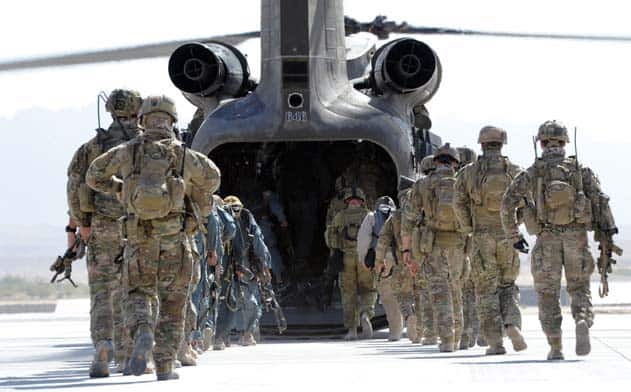The US has stepped up its bombing in Iraq after President Obama announced plans to “degrade and destroy” the jihadist group the Islamic State (IS).
Abbott is joining the rush to war by sending 600 Australian troops, combat aircraft and military equipment to the United Arab Emirates to assist the US. But increased Western intervention will only make the situation in Iraq worse.
The US began air-strikes against IS in August, justifying their actions as necessary to prevent genocide against Iraq’s Yazidis and protect Kurdish territory.
But the US’s main concern is that IS is a threat to its own influence in Iraq and potentially to other Western-backed states. Obama’s expanded operation may also extend into bombing targeting the group inside Syria.
The bombing campaign, backed-up by local forces on the ground, may be able to contain ISIS to Iraq’s North West. But the US’s options are limited given Obama’s commitment that the US will not be sending ground troops.
The US has been desperately trying to broker the formation of a functioning “unity” government in Iraq. The previous government of Nouri al-Maliki pursued a Shiite sectarian agenda, discriminating against Sunnis. In 2013 it brutally crushed protests in Sunni majority areas like Mosul using US supplied weapons.
Although Obama has claimed that Iraq now has “an inclusive government” the new prime minister comes from the same party as ousted PM al-Maliki, who remains in the government as one of three Vice-Presidents.
Indiscriminate bombing of Sunni areas by a Shiite dominated government will only reinforce sectarian divisions. Already there are reports of atrocities like an air-strike that hit a school in Tikrit killing 31 civilians including 24 children.
If the military offensive serves to prop up a sectarian government with a reputation for corruption and violence against the country’s Sunni minority it will solve nothing.
The knowledge that such a government waits on the other side of IS lines will be the greatest asset IS have in terms of entrenching their rule in Mosul and other areas of Northern Iraq.
Western hypocrisy
The dramatic territorial gains and brutality of IS have grabbed headlines across the world since it seized control of Mosul and declared a Caliphate, joining sections of Iraq and Syria, in June. IS’s brutality and intolerance are beyond question.
But the hysterical rhetoric from Obama and Abbott labelling them “pure evil” is simply hypocrisy designed to justify war.
Much has been made of IS’s beheading of Western journalists. Yet there is nothing like the same language used to condemn the imprisonment and killing of journalists who cover anti-government demonstrations in Egypt, a US ally.
There has also been complete silence about a surge of beheadings in Saudi Arabia, with at least 45 people executed this year, at least eight of them beheaded. Instead on a visit in March Obama announced that “Saudi Arabia is a close partner of the United States”.
When it comes to killing civilians Western leaders have remained silent about the 1500 civilians killed in Gaza by Israel’s latest attack, as well as the horrifying figure of over one million killed as a result of the US occupation of Iraq after 2003.
But it is no accident that political leaders and the media have simply condemned IS as a purely immoral force of “evil”.
Such moral condemnation helps obscure the fact that it was the 2003 Iraq war that paved the way for its growth in the first place.
The sectarian fault-lines that fuelled the rise of IS were engineered by the US to manage their occupation of Iraq. Faced with the prospect of a joint Sunni-Shiite rebellion against the occupation in 2003, the US encouraged sectarian divisions in order to divide and rule.
By 2006 a sectarian bloodbath had engulfed the country. At its height 3000 people were found dead in the streets every month.
The US armed and collaborated with Shiite death squads that terrorised thousands, and Sunni fundamentalist groups like Al Qaeda in Iraq (the precursor to IS) carried out their own sectarian reprisals against Shiite civilians.
All this exposes that the latest Western war in the Middle East is not a battle of “good against evil”. Western plundering, murder and meddling created the mess in Iraq and more of the same will only pour more fuel on the fire.
By Adam Adelpour and James Supple






